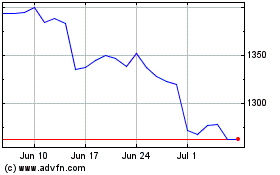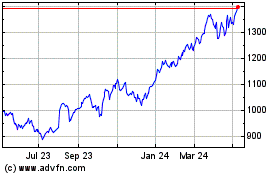Combat Jet Gets Lift From Saudis -- WSJ
March 10 2018 - 3:02AM
Dow Jones News
By Robert Wall
This article is being republished as part of our daily
reproduction of WSJ.com articles that also appeared in the U.S.
print edition of The Wall Street Journal (March 10, 2018).
LONDON -- Saudi Arabia and the British government reached an
agreement on a long-stalled, multibillion-dollar deal for 48
Eurofighter Typhoon combat jets, boosting prospects for BAE Systems
PLC, Europe's largest weapons maker.
Saudi Arabia, which bought 72 Typhoon aircraft in 2007 made by
BAE Systems, agreed in principle to acquire the additional planes
in a deal estimated at more than $5 billion. Talks on a follow-on
deal started years ago but stalled amid periods of falling oil
prices and political upheaval, including Saudi Arabia's war in
Yemen, which has been controversial in Britain.
A dearth of orders in recent years forced BAE to announce last
year it would shed about 1,400 jobs at its military aircraft
division and build fewer planes.
The memorandum of intent for more planes came during the first
visit of Saudi Crown Prince Mohammed bin Salman to the U.K.
British Defense Secretary Gavin Williamson said the deal marked
"a vital step towards finalizing another order for Typhoon jets
that will increase security in the Middle East and boost British
industry and jobs." BAE Chief Executive Charles Woodburn called it
"a positive step towards agreeing a contract."
The deal cements Saudi Arabia's position as one of the world's
biggest arms buyers. The kingdom last year agreed more than $100
billion in arms purchases from the U.S.
BAE, which builds Typhoons in conjunction with Airbus SE and
Italy's Leonardo SpA, has struggled for years to win big export
deals for the plane, putting its future at risk. But demand has
picked up, particularly in the Middle East, where regional tensions
have spurred arms deals.
Kuwait has agreed to buy 28 of the jets for delivery starting in
2020 and Qatar last year signed a commitment to take 24 Typhoons
with shipments beginning in 2022. Boeing Co. also has won big deals
for its combat jets in the region in recent years.
Details of the Saudi deal are under negotiation, including when
the Typhoon planes would be delivered. It typically takes at least
two years after a contract is signed for planes to be handed
over.
BAE may assemble some of the planes in Saudi Arabia. Riyadh,
which sought local production on the original Typhoon contract
before dropping the idea, has signaled it still has the ambition to
assemble planes domestically.
Mr. Woodburn said the defense contractor would support Saudi's
industrial ambitions laid out in the country's Vision 2030, a plan
to make the kingdom's economy less dependent on oil revenue.
For BAE, a Saudi contract opens the door to keep Typhoon
production going well past 2022 and buy time to win additional
orders. It also is a vote of confidence from a big buyer while the
company pursues export deals in other markets such as Belgium and
Finland, where it faces stiff competition from the likes of the
F-35 jet made by Lockheed Martin Corp., the world's largest weapons
maker by sales.
Dimitrios Kontos contributed to this article.
Write to Robert Wall at robert.wall@wsj.com
(END) Dow Jones Newswires
March 10, 2018 02:47 ET (07:47 GMT)
Copyright (c) 2018 Dow Jones & Company, Inc.
Bae Systems (LSE:BA.)
Historical Stock Chart
From Apr 2024 to May 2024

Bae Systems (LSE:BA.)
Historical Stock Chart
From May 2023 to May 2024
